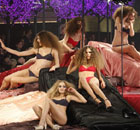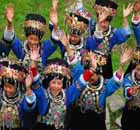Travel
Making a name in kungfu kitsch
By Lara Farrar (China Daily)
Updated: 2009-12-04 09:47

Down a small, dusty side street next to a couple of convenience stores and several new highrise apartment buildings in Haidian district sits a bamboo shack that appears anachronistically out of place.
It is meant to look that way.
The shabby structure is home to Feng Bo Zhuang, a kungfu-themed eatery intended to take diners on a martial arts-infused food journey back to a half-fantasized Chinese past filled with evil monks, heroic swordsmen and fair-skinned maidens.
The restaurant's concept takes inspiration from famous martial arts author Louis Cha, known to his readers by his pen name Jin Yong. Virtually a literary movement, more genre than author, Cha's novels of chivalry and romance have captured the imagination of millions of Chinese for more than half a century.
Since Feng Bo Zhuang was established in Hefei province in 2000, the restaurant has expanded exponentially across China. There are now 500 locations, 10 of which are in Beijing. The first overseas branch opened in Singapore last year.
All have a similar ambience. Light wooden walls are lined with ample kungfu kitsch: various swords and fighting sticks mixed with calligraphic banners and warrior-filled paintings.
 Guests are expected to bang on a large, red drum to announce their arrival after which the wait staff, decked out in appropriate marshal arts garb, greet clientele as "swordsmen" and "swordswomen" and guide them to modest tables surrounded by low, and not exactly comfortable, wooden benches.
Guests are expected to bang on a large, red drum to announce their arrival after which the wait staff, decked out in appropriate marshal arts garb, greet clientele as "swordsmen" and "swordswomen" and guide them to modest tables surrounded by low, and not exactly comfortable, wooden benches.
From there, the experience slides back further into China's past. There are no menus. Instead, staff take it upon themselves to decide for the table what humble grub best suits the palates of kungfu masters who have entered from fighting modern-day battles on Beijing's busy streets.
For four people, a spread of six dishes served on replicated ancient warrior pottery from Anhui province is usually selected. Rice-covered chunks of meat and egg, also known as "big power meatballs", are always included in the mix.
Other popular selections include fried prawns, bean curd with chicken soup and a spicy fish soup with peanuts and broiled greens. The average price of a dish is around 25 yuan. For those looking to splurge, a platter of roasted donkey meat is available for 75 yuan.
These can all be washed down with a silver flask filled with the restaurant's strong brew of homemade wine.
If any of the platters fail to suit the palates of guests, staff will eagerly replace them with another Chinese culinary creation at no extra charge (unwanted food is bizarrely disposed of in a trash can in front of guests).
Feng Bo Zhuang is frequented mostly by Chinese looking to relive at least a small piece of the kungfu fantasies that filled their childhood imaginations as well as recall a vast period of Chinese history that subtly floats underneath the country's rapidly modernizing reality today.
A few foreigners come as well. However, for them, the experience may not be as endearing as it is for those longing to taste memories that transcend lifetimes, generations and entire chapters in time that make up the cultural lifeblood of the country itself.
Meng Jing contributed to the story
Add: No 75 Baofusi Road, Haidian district
Tel: 010-62652729









